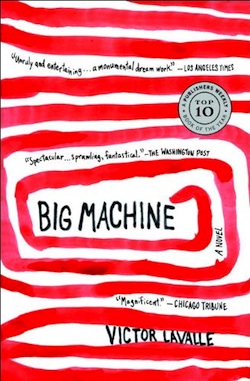Happy Tuesday! It’s time for Genre in the Mainstream; Tor.com’s weekly column dedicated to works of literature that employ elements of science fiction, fantasy, and horror in what are seemingly mainstream works of fiction. We’re not necessarily saying these writers are now part of the speculative fiction club, but chances are if you like science fiction or fantasy, you’ll like these books too.
This week, a hidden war between angles and demons is revealed in Victor LaValle’s Big Machine.
Nominated for numerous awards, including WINNING the Shirley Jackson Award in 2009, Big Machine might seem like one of those titles you’ve “heard of” or “meant to pick up” but never got around to, which would be a shame, because it’s one of the more unique novels of the last few years. Even before some of the speculative fiction elements start to creep into the story, the novel is distinctive right away because it is not entirely clear what it is even about or what is going to happen next. It shouldn’t be a feat for a good book to keep you guessing and turning the page, but the mysteries presented by Big Machine, from the first chapter on, feel downright new.
At the start of the novel we’re introduced to Ricky Rice, a former junkie in his early 40s who seems to have lost in the game of life. This picture is made all the more complete by the fact that Ricky is a janitor at a bus station. However, Ricky immediately receives a strange summons in the form of a bus ticket with a cryptic note. Against all reason, or because Ricky seemingly has no future, he gets on that bus and soon finds himself inducted into a strange secret society called “The Unlikely Scholars.” The scholars are unlikely because, like Ricky, they are from impoverished backgrounds and/or have all had problems with drugs, drink, crime, or other “messy” aspects to their pasts. All the scholars, including Ricky, are also black.
As a black author, LaValle doesn’t shy away from dealing with race and how it relates to socio-economic problems, or ways persecuted and oppressed groups are susceptible to the manipulations of fringe cults. In a recent interview with The Believer magazine, LaValle noted that being a black author was important to him, and went on to point out that everyone must write from his or her experiences. “Try imagining James Joyce not writing about being a Catholic.” This is relevant and informs LaValle’s writing in the following way: despite the serious ethical themes inherent within Big Machine, issues of race or economic class do not draw attention to themselves in artificial ways, because LaValle doesn’t have a bone to pick about racism per se. Instead, he’s got bigger fish to fry: he’s concerned about the whole nature of good and evil, and which team you’re on.
The Unlikely Scholars form a sort leauge of underground good guys, searching for signs of the supernatural. They also are all vaguely aware that someday they’ll have to do battle with Solomon Clay, a man formerly of their ranks, now turned against them. Ricky and a woman named Adele Henry (know as the Grey Lady) are sent to track down Solomon and stop him. What they are stopping him from doing is intially unclear. But soon, in addition to employing suicide bombers, we learn Solomon is in contact with otherworldly forces. Additionally, both Ricky and Adele encounter strange entities known as Swamp Angels, grotesque ghosts/creatures which end up being the focal point of the entire novel.
Employing an occasional use of the 2nd person, LaValle creates another fantastic mystery about who the story is being narrated to in the first place. Without giving too much away, I will say this: a character that is not entirely human ends up being (in addition to the reader!) the recipient of the entire novel. Elements of alternate history also feature prominently in the back-story of Ricky and The Unlikely Scholars, which succedes in creating a world slightly skewed from our own.
Last Spring, I talked to LaValle for Clarkesworld Magazine, and he confirmed that his roots in science fiction and horror literature were deep. If a reader finds themselves in the middle of Big Machine and feels like they are reading a Harlan Ellison story, that’s because LaValle is a big fan of I Have No Mouth and I Must Scream. It’s evident that LaValle is interested in horror that crosses over into the supernatural and in addition to Harlan Ellison, traces of H.P. Lovecraft also permeate a good portion of the text.
Equal part social commentary and supernatural adventure, with a good dose of page-turning horror, Victor LaValle’s Big Machine is a highly unique novel with a number of surprising twists, including an ending that I will simply not spoil for any of you. Read it!
Ryan Britt is a staff writer for Tor.com. He lives in Brooklyn.










